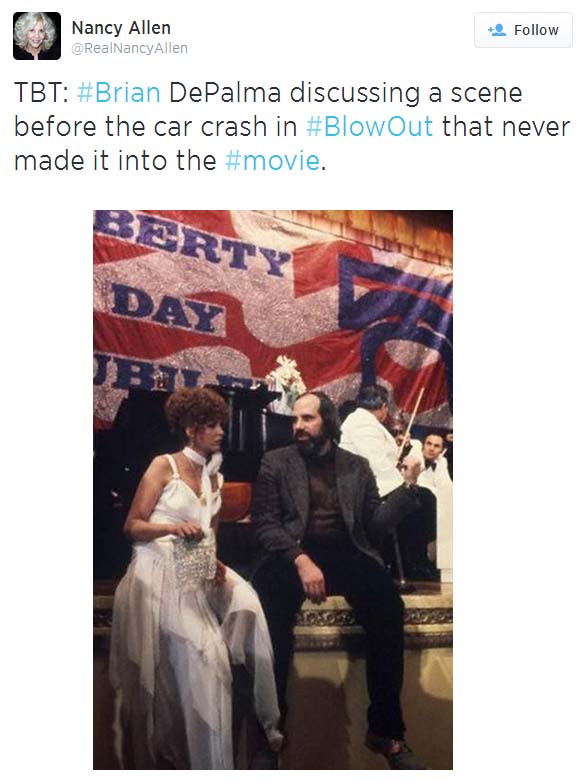
 Hello and welcome to the unofficial Brian De Palma website. Here is the latest news: |
|---|
E-mail
Geoffsongs@aol.com
-------------
Recent Headlines
a la Mod:
Listen to
Donaggio's full score
for Domino online
De Palma/Lehman
rapport at work
in Snakes
De Palma/Lehman
next novel is Terry
De Palma developing
Catch And Kill,
"a horror movie
based on real things
that have happened
in the news"
Supercut video
of De Palma's films
edited by Carl Rodrigue
Washington Post
review of Keesey book
-------------
Exclusive Passion
Interviews:
Brian De Palma
Karoline Herfurth
Leila Rozario
------------
------------
| « | August 2014 | » | ||||
| S | M | T | W | T | F | S |
| 1 | 2 | |||||
| 3 | 4 | 5 | 6 | 7 | 8 | 9 |
| 10 | 11 | 12 | 13 | 14 | 15 | 16 |
| 17 | 18 | 19 | 20 | 21 | 22 | 23 |
| 24 | 25 | 26 | 27 | 28 | 29 | 30 |
| 31 | ||||||
De Palma interviewed
in Paris 2002
De Palma discusses
The Black Dahlia 2006

Enthusiasms...
Alfred Hitchcock
The Master Of Suspense
Sergio Leone
and the Infield
Fly Rule
The Filmmaker Who
Came In From The Cold
Jim Emerson on
Greetings & Hi, Mom!
Scarface: Make Way
For The Bad Guy
Deborah Shelton
Official Web Site
Welcome to the
Offices of Death Records
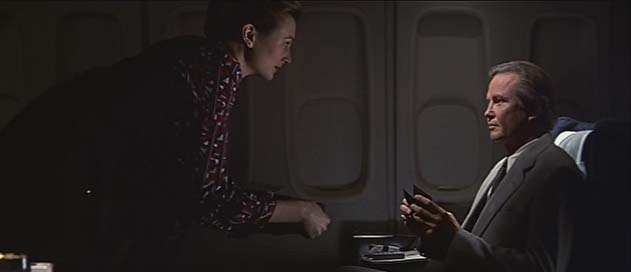
Voight: I actually wrote another ending for the first movie and I gave it to Tom [Cruise]. I don’t know if I wrote it out, but I had this idea that they found messages coming and it was from Jim Phelps. They thought they killed him but they hadn’t killed him, and he returns, and the other guys return too. The people he thought were dead were not dead. It was all to try to get the mole. He was being used by us, but it didn’t work out.
Topel: Did you discuss that with Brian De Palma?
Voight: Yeah, I think I did. He wasn’t interested.
Topel: The thing was Jim was the hero on the TV show.
Voight: I felt badly about spoiling that image. I felt bad about it.
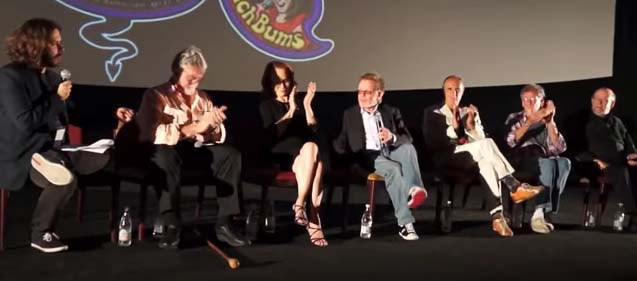
Edgar Wright [to Gerrit Graham]: And you worked with Brian twice before this—Greetings and Hi, Mom.
Gerrit Graham: Right. I was a sophomore at Columbia University in New York City. I then made general manager of the Columbia Players, basically because nobody else wanted the gig, and it was the extracurricular theater group. And one day I was down in the Players office, during a non-production period, which was extremely unusual that I was down there at all, and the phone rang, and it was this guy saying, "I was in the Players years ago, for old-times’ sake, you guys might be willing to help me with..." he wanted extras, and I could make wardrobe stuff. "Sure, sure, sure." And he said, "I would also be happy if you could find me a couple or three actors, experienced actors, particularly with comedic experience. People in the fine arts program there, or Minor Latham Playhouse, across the street… And if you find people like that, will you send them down to see me?" And I said, "I sure will. And what is that address again, Mr. De Palma?"
And you must guess by now that I never sent another soul down there. I went to see him myself, and ended up in the living room with a producer, who happens to be the brother of our editor, and improvised with… well, there was another guy named Bob who was there all the time, and a third guy sort of rotated in and out. And we just improvised on various suggestions that Brian made, and ultimately ended up with Bob De Niro, and me, and a third guy named Jonathan Warden. And Brian had a scenario without a script. And he had certain ideas that he wanted to make sure made it in. But we improvised the entire thing. And same thing with the sequel, the following year, a sort-of sequel called Hi, Mom! And by the time we got to Phantom, he just called and asked me if I wanted to play the part. And interestingly, the part he initially offered me was Swan. [Looking at Paul Williams] I don’t know if you knew that.
Paul Williams: Oh, I did know. And at one point he asked me about playing, my initial offer was Winslow. And I went, "I’m too little to be scary. You know, you picture this little guy throwing things down and…" [laughter]. What Bill Finley did with one eye, I don’t know another actor could do what he did [applause].
Wright: I don’t know anybody else that could pull off Beef.
Graham: Well, I was young dumb and full of cum [laughter]. I don’t have a really clear picture of what I was doing. Brian asked me to come out and audition musically, I think it was, for him [points to Williams], and for Paul, and [looking at Williams] I don’t know if you remember this: "Well, that was good… can you make it a little more, uh, sort of, uh, bigger? More…" And finally the word they settled on was "flamboyant." [Laughter] "Would you make it a little more flamboyant?" Which was, of course, code at the time for "gay," and I said, [puts hand on hip] "What do you mean, like this?" [Pointing] "Bingo! That’s it!"
Williams: Brian said, "Yes!"
Graham: And to me it was just cheap schtick, you know? But it turned out to be an actual character. It was just something in me [poimts to his own brain]. I don’t know what that says about my sick brain, but it’s just the character that came out fully-formed. Because of the earlier films I’d done with Brian, and that relationship, I trusted him and he trusted me that we would be able to satisfy each other’s aims and intentions. So I had a great deal of freedom. A great deal of freedom to do whatever I wanted. And one of those lines in the scenes with George Memmoli—and I must say here at this point, those scenes are funny because there were two people involved, one was me and the other was George Memmoli, and those scenes would not have worked without George [applause]. It was what you might call a double-act. But lines that are among peoples’ favorites, like "Dry-up, Tubbo," [Jessica Harper tells him to say it again, in character] "Dry up tubbo." [Laughter] For my lines, they were improvised, it didn’t strike me at the time as interesting or difficult or anything.
PAUL HIRSCH'S FIRST LOVE WAS MUSIC; PAUL WILLIAMS FEELS THE RHYTHM OF 'PHANTOM'
Wright [to Paul Hirsch]: After you had already done Sisters with Brian De Palma, you would go on to have much bigger hits with Brian, and some of the biggest hits of all time, Star Wars, Empire Strikes Back, but this really, when you were making it, you must have been aware, you know, you were pushing the boundaries, you kind of… in terms of the producers and the studio, were they even aware of what they were gonna get, with the finished product?
Paul Hirsch: Well, I don’t know that we had that kind of perspective on what we were doing, we were just doing it. We weren’t outside ourselves looking at ourselves doing it. And it has to be pointed out that this was not a studio production. This was an independent production that was picked up by 20th Century Fox. The picture would never get made today, and probably wouldn’t have gotten made then, if not for having been an independent production.
But, it was a thrill for me, because I had been a music student in high school. I took music and art in New York. And I played the drums, and music is my first love. And I’m not really a great musician. I’m a music lover more than a musician. And to edit a musical was for me… it used all my musical ability for whatever it is, and it was extremely fun. And it’s interesting watching it. I haven’t seen this picture in forty years. I remember the montage at the end, where we highlight the members of the cast, we had this song that had not been used in the film, and we wanted to use, this wonderful song, and upbeat—ironically upbeat, but upbeat nonetheless—and we felt that the ending of the picture was kind of very depressing, and we wanted to remind the audience of what a wonderful time they had during the first hour and a half. So, we added this montage at the end to lighten the mood.
Paul Williams: Two things I wanted to say: one is, if you watch a movie that was made forty years ago, you’ll notice a difference in the rhythm of the way a film was cut. Things are cut so much quicker now. So if I see pictures that I really love from thirty or forty years ago, sometimes the cut is too slow for me. That never happens in this. [Speaking to Hirsch] Watching your editing of Phantom Of The Paradise, I don’t think there’s a spot in there where I feel anything close to a lag. [Snapping his fingers with rhythm] It’s the timing of it, and it relates to the music, as well. I mean, there’s something in that.
And what was the other thing I was going to say, because it was really great, too [laughter]. Oh, I know what I was going to say. Originally, the song—one of the great tragic moments for me was when we didn’t get to shoot the scene The Hell Of It was written for. Because originally there was a graveyard scene where, you know, a big funeral scene for Beef’s funeral, and [looking toward Hirsch] I don’t know why we never shot it, I don’t know if we didn’t have any money, (nodding) was it finances? Didn’t have enough money to shoot it.
But what I wanted to do was kind of take off on Nina Rota, you know, and do that kind of 8 1/2 ending, with everybody dancing around in a little circle around the grave, and if you follow all the cables, you go back to a hearse, [smiling] where Swan is recording the funeral, and at the very end a little girl jumps on the casket that’s being lowered into the grave and starts tap dancing, auditioning for Swan [laughter], and that’s what that sound is [mimics piano playing]. But thank God, instead of it getting tossed out [gesturing toward Hirsch], you grabbed it, cut the end credits to it, and it’s one of my favorite things that’s in there at the end. [Applause as Hirsch tells him, “Thank you.”]
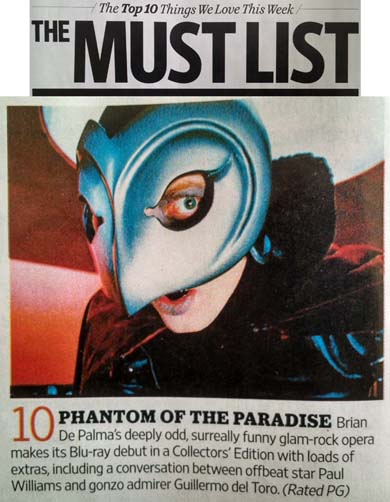 Phantom Of The Paradise has made this week's "Must List" in the current issue of Entertainment Weekly. It's the August 8 2014 issue, with Doctor Who on the cover. The Swan Archives points out that back in 2006, EW published its list of Five Must-See Glam Rock DVDs, adding insult to Phantom Of The Paradise at the bottom by giving the film its own category: "one to skip."
Phantom Of The Paradise has made this week's "Must List" in the current issue of Entertainment Weekly. It's the August 8 2014 issue, with Doctor Who on the cover. The Swan Archives points out that back in 2006, EW published its list of Five Must-See Glam Rock DVDs, adding insult to Phantom Of The Paradise at the bottom by giving the film its own category: "one to skip."
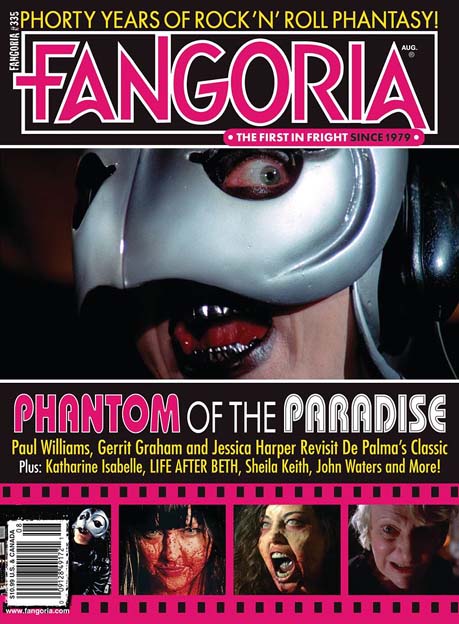 This is the cover of the upcoming issue of Fangoria, coming soon...
This is the cover of the upcoming issue of Fangoria, coming soon...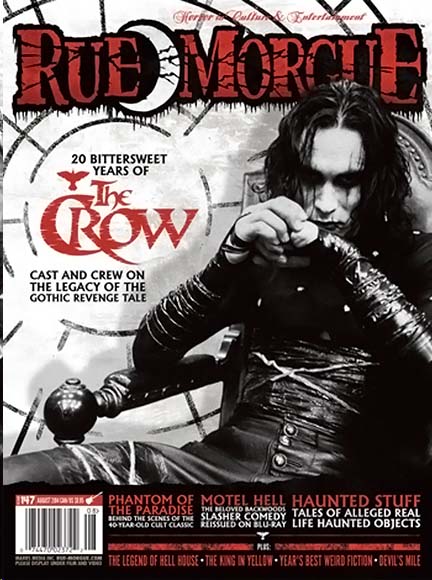 And issue #147 of Rue Morgue, out now, includes a Phantom Of The Paradise retrospective written by Justin Humphreys, author of Interviews Too Shocking To Print!. The magazine article includes material from the book's interviews with William Finley and Jack Fisk, as well as brand new interviews with Ed Pressman, Jeffrey Comanor, Peter Elbling, production manager Gary Kent, and Phantompalooza organizer Gloria Dignazio.
And issue #147 of Rue Morgue, out now, includes a Phantom Of The Paradise retrospective written by Justin Humphreys, author of Interviews Too Shocking To Print!. The magazine article includes material from the book's interviews with William Finley and Jack Fisk, as well as brand new interviews with Ed Pressman, Jeffrey Comanor, Peter Elbling, production manager Gary Kent, and Phantompalooza organizer Gloria Dignazio.
"Creature Features' Taylor White introduced the film," reports the Archivist, "which was followed by a generously long panel discussion hosted by Wright, and a short talking head video from Guillermo del Toro was screened, in which he spoke eloquently of his longstanding love for Phantom, and of how influential and inspirational it, and De Palma in general, have been to his own art. Ed Pressman had provided a video as well, which was not screened due to 'technical difficulties'." Maybe Ed will let us post it to the Archives, so it can be seen... Our Principal Archivist was very happy to have a chance to chat with Paul Hirsch, who hadn't seen the film in forty years, and was immensely gratified to see it with the sort of responsive audience that had been hoped for, but never attained, in the film's initial release, and, in particular, that the laugh lines fell how they were supposed to, that people broke out in applause after the musical numbers, and that the film 'worked'."
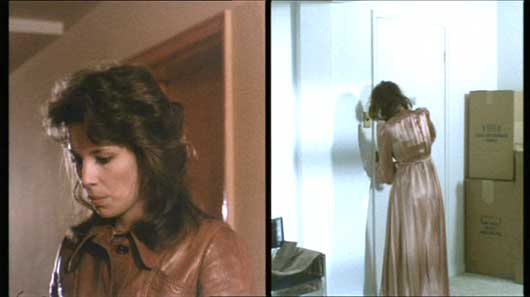
-She & Jon Voight became a couple on Midnight Cowboy
-Salt & De Palma were pals who'd met at Sarah Lawrence College; they dated for a little while, but mostly stayed close through the years.
“I quite adored him. He was so dark and funny. And… nobody’s like Brian [laughs]. He has the best sense of humor. The darkest sense of humor. It completely lines up with mine. And so in some way I felt like we were soul mates.”
Flaherty: "Did they invent the term, 'Does not suffer fools lightly,' for him? I mean, is he the type, does he have little patience…?"
“Very little patience. Yeah.”
Flaherty: "But it’s kind of charming. He’s so smart and he’s charismatic if he wants to be."
“Well, it’s charming to me, when he’s being… when I’m not the target. I think there are plenty of people who are scared to death of him. But that’s just who he is.”
-Salt and Margo Kidder met during auditions for Fat City (John Huston movie)
-Malibu Beach House – they hosted many new wave of Hollywood directors
“The truth is it all started because Brian came out to visit, because Brian and I were tight. And he began bringing his friends out, and Marty was his friend, Trader was his friend, Harvey Keitel was anywhere Marty was, um, and Spielberg was, you know, a little acolyte.”
Paul Schrader was following De Palma around as a journalist.
“One of the people who came out was a director named Paul Williams, who I had made a movie called The Revolutionary with, and his producing partner was Ed Pressman. They had gone to Harvard together. And they came out and they loved the scene, and became part of it, and Ed Pressman became friendly with Brian. And somehow, Brian convinced Ed to finance the movie Sisters. Now, the thing is, I didn’t know much about it. Because Brian was off doing his thing, I was off doing mine, and whatever, but it was Christmastime, Christmas Day, we were all together and we had a big Christmas tree. Brian was living there. He was dating Margot, and he was living at the house. And so, we all were sitting around the Christmas tree, giving out presents, and he went over to the Christmas tree and took out two presents and handed one to Margie and one to me, and we opened them up, and it was Sisters. The script! And he said, 'Girls, we’re going to New York, we’re gonna make this turkey in April! Pack your bags. Go to the gym.' So, and that’s what we did… Ed was the producer, and Ed financed the movie.”
Flaherty: "That’s amazing. And you shot it all in New York?"
“Mostly Staten Island.”
Flaherty: "It is such a beloved movie. By the way, I own that poster. Print, framed, hanging in my garage, not in the house, but I love it."
“My friend Tim Hunter gave that to me. He found it somewhere.”
Flaherty: "And how was Sisters? You had already worked with Brian. I mean that’s just a crazy… it’s like Hitchcock on acid a little bit, right?"
“I think it’s a fantastic movie. And I mostly think Margie is brilliant. That’s the thing I think more than anything. She’s so amazing that I can’t believe it. And I love... it’s so original, and the way he shot it, when you look at it now, I mean, it’s like, everybody and their mother has been shooting like Brian shot that movie, since then. You know what I mean?”
Flaherty: "He loves Hitchcock so much, you know, you’re like Margo’s looking for the pills, and the cake, and the guy’s starting to write ‘Happy Birthday’ and he’s barely …"
-Salt said they pay homage to De Palma on a daily basis on American Horror Story, for which Salt is a co-producer and screenwriter.

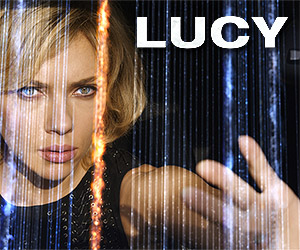 "[Scarlett] Johansson plays Lucy as a mouthy hanger-on who’s transformed into a ninja Carrie White in The Matrix."
"[Scarlett] Johansson plays Lucy as a mouthy hanger-on who’s transformed into a ninja Carrie White in The Matrix."
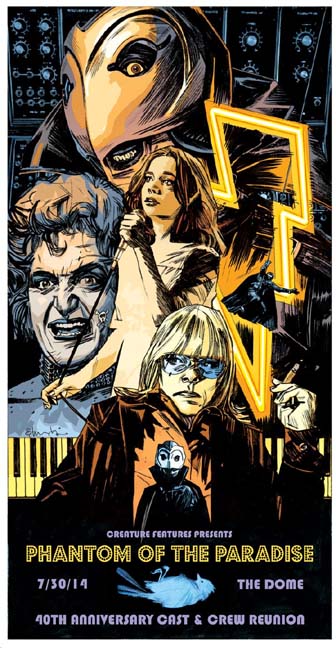 At left is new art created by Tommy Lee Edwards for the 40th anniversary screening of Brian De Palma's Phantom Of The Paradise, which happens Wednesday, July 30th, at the Arclight in Hollywood. The limited edition screen print, which will be available for purchase at the event, will also be given to those with VIP tickets, according to the Swan Archives.
At left is new art created by Tommy Lee Edwards for the 40th anniversary screening of Brian De Palma's Phantom Of The Paradise, which happens Wednesday, July 30th, at the Arclight in Hollywood. The limited edition screen print, which will be available for purchase at the event, will also be given to those with VIP tickets, according to the Swan Archives.